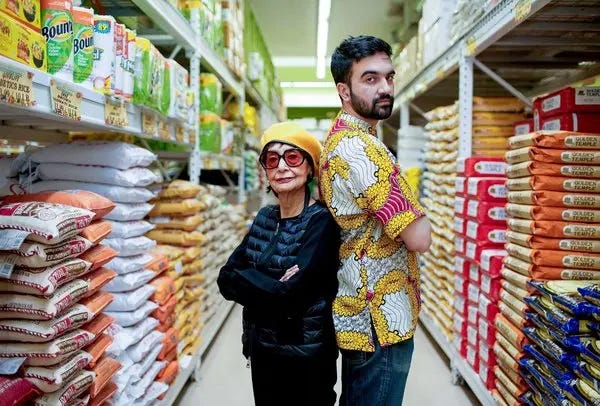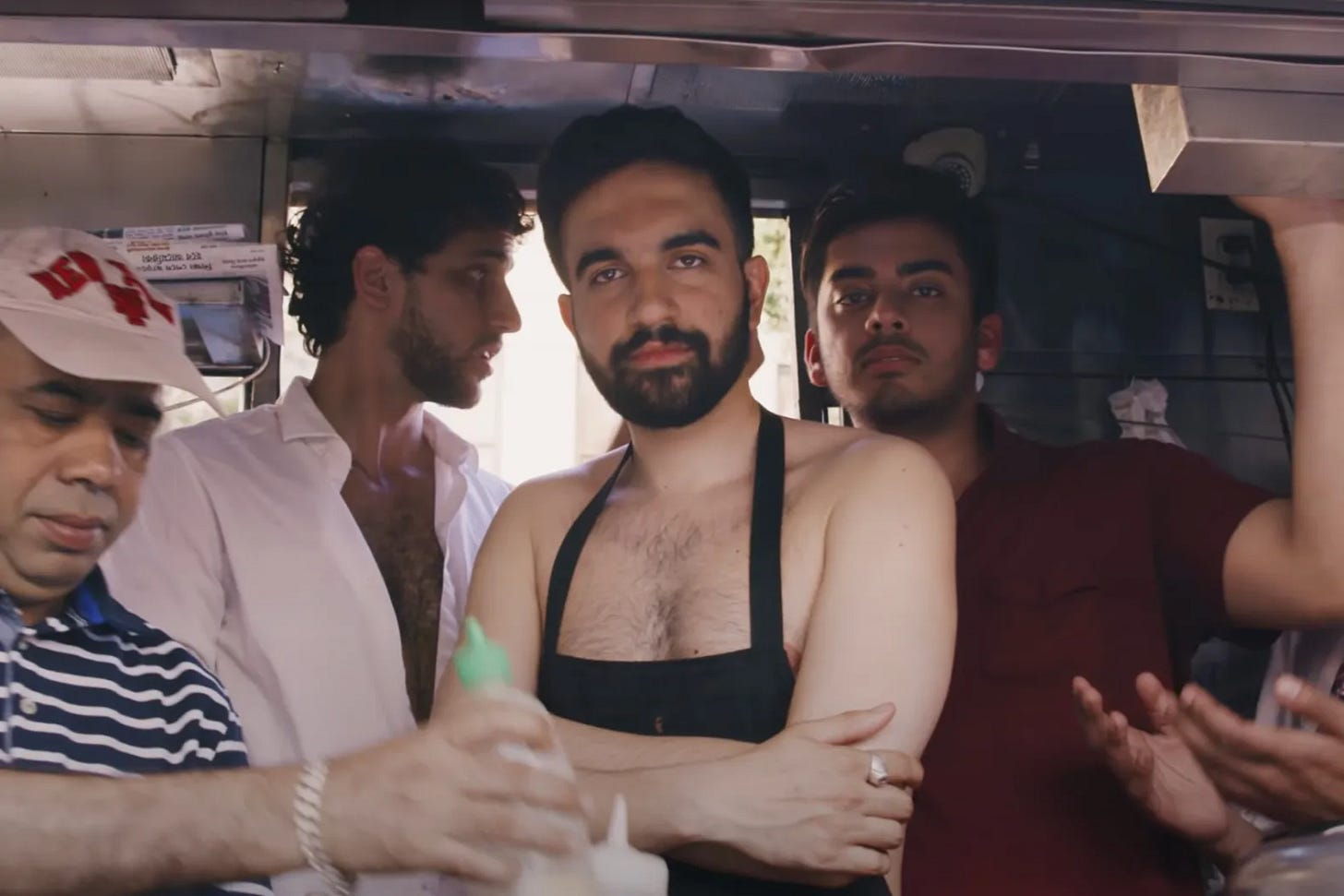Master of Ceremony Zohran Mamdani
Initial Musings on Young Cardamon, Creativity & Comms
I’ve waited before sharing my thoughts on Zohran Mamdani’s win—not because I didn’t have things to write, but because I wanted time to reflect on why his campaign was so successful. There’s a lot to unpack here, especially from the perspective of communications and creativity. So, I’m predicting I’ll need to write a couple posts.
Ultimately, I believe we’re in a political moment that requires us to seriously consider the power of creativity in organizing.
(Zohran Mamdani aka Young Cardamon poses w/ Madhur Jaffrey for his song, Nani)
I recently wrote a piece for Hammer & Hope that fleshes out a framework around this idea. In the piece, I explore the overlap between the process of art-making and the process of political organizing.
For those who don’t know, Young Cardamon was Zohran Mamdani’s rapper-name. Side note: I can relate to creating an artistic alias. I went by the moniker madlines (and still do on some of my social media profiles), which I’ve discussed in previous podcast episodes. The first thing to think about is how misunderstood and devalued the arts are in the United States. I have on-the-ground experience with this as an arts-educator for over ten years.
When I worked in schools or afterschool programs, administrators often focused solely on the final performance or publication. It was frustrating because, to me, it screamed talent show as opposed to educating to liberate. Standard educational modalities, like, for example, the banking model of education, treat students like products and art as an afterthought to beautify the “hard sciences.”
But the real transformation I saw? That happened through facilitation—during conversations, creative risks, mutual support, and the development of young people's ability to imagine beyond material constraints. In essence, it didn’t matter to me whether or not a student decided they’d become a poet, a writer or a performer. I’d help prepare them to create their best work of course, but who cares if they forgot their lines or wrote their first poem, which was full of clichés. This was a process to me. What mattered was if they stretched their emotional intelligence, gained valuable literacy and public speaking skills, built genuine community with classmates and gained confidence. That same spirit is crucial in movement work.
This is a movement, not a moment. We’re undoubtably in a disparaging, difficult political landscape right now. Many believed wins were impossible. Yet, Zohran’s campaign showed that there are cracks and openings for mass education and organizing. I highlight this in my essay: the process of politicizing people is crucial, necessary work, whether or not we gain a tangible political win or not.
Rapper’s Delight, Rigorous Creativity
Let’s talk about Zohran’s artistic background. I’m not sure if he explicitly identifies as a producer/rapper anymore, but his upbringing certainly immersed him in multidisciplinary arts. His mother, Mira Nair, is a groundbreaking South Asian filmmaker known for telling powerful stories through films like Monsoon Wedding and Mississippi Masala. Zohran himself has collaborated on her creative projects, including music videos—one of which featured Lupita Nyong’o. While some poked fun at this, I see it as a meaningful cross-cultural moment. Who cares if his raps were a little cheesy. That was kind of the point. In addition, Zohran’s father, Mahmood Mamdani, is an academic who specializes in colonial, post colonial, African and international politics at Columbia University. His parents’ progressive politics most likely contributed to his own righteous values, and yet, Zohran doesn’t speak at people or in exclusively academic jargon (a massive problem within leftist spaces).
There are elements of Zohran’s rhetorical abilities that clearly draw from hip hop culture. In hip hop, to be effective you need to hone a deep sense of confidence, public speaking prowess, improvisational skills, and a flexible knowledge of poetic device and rhythm. Remember when Zohran punked Andrew Cuomo during a debate? Those same abilities are powerful tools in organizing, especially when speaking to a crowd, knowing your audience or navigating high-pressure debates.
Hip hop culture, rooted in Black culture, has always been a rigorous, creative practice, despite how often it’s discredited, oversimplified or appropriated. Zohran’s campaign, intentionally or not, tapped into the lyricist spirit. It reminded me of the recent epic battle between Kendrick Lamar and Drake—after Kendrick released his mic dropping “Not Like Us,” a teacher shared a short video about how her students were suddenly doing deep research, digging into literature and history. Her observations didn’t surprise me in the least bit. I’ve used hip-hop to teach literature for almost ten years.
So no, Zohran isn’t pursuing a rap career, but his artistic sensibility such as his ability to communicate/debate with rivals, to connect with regular people, to imagine, was foundational to his campaign. And if the left is serious about winning in the future, we need to take art, culture, and imagination just as seriously as strategy and policy. The strenuous work of building something new—just like making great art—isn’t about a perfect product. It’s about the process, the people, and the courage to dream up something better. Zohran’s ability to speak plainly yet powerfully, and to make big ideas accessible to everyday people wasn’t accidental. It likely came from years of learning how to talk to people through art and hip hop culture.
Let’s talk about how this ties directly into organizing.
Let This Radicalize You
Whether or not a campaign leads to a win, what matters is the approach. In Zohran case, yes, he won the NYC Democratic primary—and that win was rooted in socialist principles and powered by the organizational muscle of the Democratic Socialists of America (DSA). Make no mistake, the DSA’s structure made it possible to mobilize thousands and thousands of people to knock on doors, spread the word, and make the campaign visible. That kind of support can’t be overstated. But another big piece of the puzzle was Zohran’s openness to the politicization process. Instead of writing off voters who might have voted for Trump or held opposing views, he and his team made the decision to go into those communities and talk to people. Listen. Connect. Meeting people where they are, without assumptions is rare and powerful. And it made a difference.
What’s Possible?
Throughout the campaign, critics dismissed Zoran by saying he "lacks experience." But not only is that untrue, it also totally misses the political landscape we're in. We’re living in a time in which a messy, actively ignorant, former reality TV star is president. Trump utilizes his background in media to stir up free press. He’s versed in shock and awe tactics, simple slogans and fear mongering. He follows in the footsteps of tyrannical leaders like Hitler who believed, "men are won over less by the written than by the spoken word, that every great movement on this earth owes its growth to great orators and not to great writers.” We should know our enemy. Political legitimacy has been thrown into question by the very system that once tried to protect it. That creates an opening. This doesn’t mean we abandon our righteous values, it means we’re at a turning point. In that space, people are more curious as to hearing what socialism actually is, instead of the caricature they’ve been sold. They can be radicalized towards liberatory ideas. Yes, organizing through the Democratic Party has its constraints. But we can still use that platform to shift public understanding and that’s exactly what Zohran is doing.
In the coming weeks and months, we can’t ignore how Mamdani is responding to the disgusting Islamophobia and racism being hurled his way as well.
His grace, clarity, and defiance in the face of it are setting a new standard for how we show up, how we lead, and how we support each other. It reminds us how vital it is to stand in solidarity and to build movements that don’t just tolerate difference but actively fight for each other’s liberation.
Mamdani’s campaign isn’t just a political win. It’s a potential roadmap for how organizing, creativity, and communication can come together to crack the political landscape open and let something better begin.


